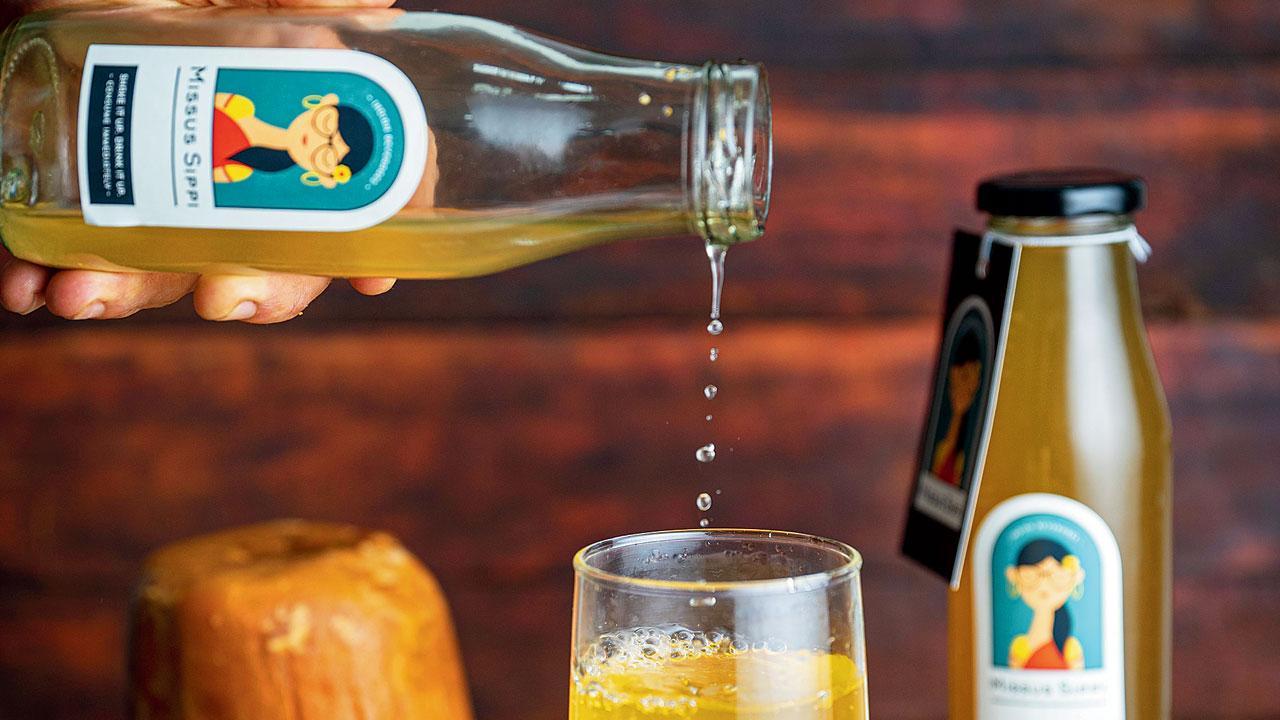The pandemic has stirred a revival of interest in healthy non-alcoholic Indian drinks via home deliveries and DIY kits. Here are some of our favourites

Panakam
In September 2020, Pragnesh Rai launched Missus Sippi, a beverage delivery kitchen that focused on Indian regional drinks. “During the lockdown, it was a good time to focus on everything healthy, local and nutritive. I thought that the country’s regional drinks were unexplored; we wanted a list that spoke of nostalgia and homeliness,” says Rai.
ADVERTISEMENT
Kanji punch
With 17 regional beverages and 15 detox drinks, his menu goes beyond jal jeera and lassi. We like the lesser know kulukki sarbat, a lemonade with sabja from Kerala and South India’s spicy panakam—for which they source the traditional nannari syrup. For milk fans, we recommend Madurai’s jigar thandai, a milk cooler with rose and poppy seeds.
Megha Iyer of Beeji’s, a north-Indian vegetarian delivery kitchen located in Santacruz West, was surprised when between 20 to 30 orders came her way daily for the haldi cinnamon doodh. “To be honest, we did not expect something as simple and humble as the haldi doodh to be a bestseller. It’s been a wonderful surprise,” she says.
Clinical nutritionist Lovneet Batra says that the pandemic brought the focus back to health, with people realising that it’s not supplements they should be resorting to but the conscious consumption of ingredients that suit their body needs.” Batra’s book, 50 Desi Super Drinks, an easy guide to gut health, was launched in January this year. She highlights a challenge this generation of Indians face—consuming too much information but doing little to make simple life changes. “Nutrition is a delicate science, and it is equally important to understand when to consume something,” she warns.
Haldi doodh
She was inspired by the testimony of clients all over the world who were ready to pay big bucks for gut-friendly drinks like kombucha and kefir. “Yes, they are great, but we have so many ingredients in our own kitchens that will do the same job, but we are not aware. Indian drinks are well curated season wise to help us pick the best nutrition for our body and weather conditions,” says Batra. She highlights the power of kanji, a probiotic, and shikanji. “For a liver detox, I suggest having wheat grass. For PCOS, buckwheat (kuttu) tea is known to increase inositol. Haldi doodh is good for immunity, and for PMS, there is the ajwain kadha with gur.
While the pandemic drew our attention to conscious choices, it also allowed us to indulge. Pankaj Gupta of Oye Kake has opened a QSR chaat counter next to the Fort restaurant and included a lassi menu that offers 40 different varieties of North India’s favourite yoghurt-based drink. Aside the caramel to avocado flavours, there is the Indian decadent version that includes kesar, and mango. “Indian ingredients like sabja, khus and kanji are being used the world over. Even bars are creating their own syrups instead of going for preserved products. We are also serving a doodh soda, which has milk, soda, khus, sugar and chia seeds,” he says.
Chef Vinod Rana makes avocado lassi at Oye Kake. Pic/Ashish Raje
With summer here, Manoj Jangid, Director Food & Beverage, JW Marriott Mumbai Sahar, says that their Marriot on Wheels Sunday Brunch delivery box will now contain kanji punch, kokum lassi and aam panna alternately. “These drinks are seasonal coolants and people today prefer drinks without preservatives. Even our staff is trained to offer fresh juices and drinks before preserved options,” says Jangid.
For homemade thandai mix
This trend also trickles into the home chef space. In August, grandmother, mother and daughter trio Asmita, Payal and Aashna Sheth, started making small batches of thandai mix (Rs 380), kesar badam milk masala (Rs 500) and pudina chaas masala (Rs 120) via www.baskafoods.com. “Our thandai mix is a fennel and rose based summer coolant made with traditional Indian spices, seeds and nuts. The milk masala has almond and pistachio that go well with dairy based milk or vegan alternatives such as almond or soy milk. Baska Foods was born with the aim to make everyday kitchen life easy. The products are made fresh just like at home, enabling you to use them as often as every day,” says Aashna.
Phalsa sherbet: Bloating buster
Serves: 2 | Serving Size: 1 glass
Ingredients
250 g phalsa
100 ml water
1 tsp jeera
Method
Wash phalsa thoroughly. In a blender, add water and phalsa together and blend properly.
Add jeera.
Bael (wood apple) juice: Digestive cooler
Serves: 2 | Serving Size: 1 glass
Ingredients
1 bael fruit
1 cup of water
1 tsp black salt (according to taste)
Method
With a spoon scoop out the soft pulp of the bael fruit.
Add 1 cup of water and soak for 20 minutes. Mash the pulp well and strain the mixture. Stir with a spoon so that the mixture is strained well. Add black salt according to taste. Mix well. Serve chilled.
Courtesy: Lovneet Batra
Kokum lassi
Ingredients
60 ml kokum extract
150 ml beaten curd
30 ml jaggery syrup
Salt to taste
Method
Add the kokum extract, yoghurt and jaggery syrup in a bowl. Using a wooden churner or blender beat it well. Once the yoghurt gets smooth and slightly frothy add salt. Again churn or whisk it until it is becomes frothy. Pour in glass, garnish with a slice of kokum petal.
Courtesy: JW Marriott Mumbai Sahar
 Subscribe today by clicking the link and stay updated with the latest news!" Click here!
Subscribe today by clicking the link and stay updated with the latest news!" Click here!






